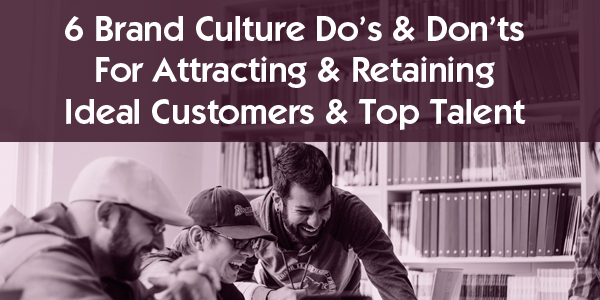
6 Brand Culture Do’s and Don’ts for Attracting and Retaining Your Ideal Customers and Top Talent
Strong brand culture is effectively the key to business success because it is the essential backbone to everything your business stands for and does.
It’s the bedrock underpinning and providing the direction for your whole business – what people see, think, hear, experience and feel about your business both internally and externally.
In fact, a strong brand culture involves a lot more than you first may think. — “Even the most creative business leaders I know recognize that success is not just about marketing differently from other companies: more daring adverts, more new products, more aggressive use of Twitter and Facebook. It is also, and perhaps most importantly, about caring more than other companies — about customers, about colleagues, about how the organization conducts itself in a world with endless opportunities to cut corners and compromise on values.”[1] It requires caring for your people, at every level.
The decision to invest time and energy into creating a powerful brand culture will ultimately lead your company to greater success. When more companies understand the importance of brand culture, they grow and the economies in which they operate grow along with them, as evidenced by the organisation included in this post.
Related: How to Build Your Brand and Mistakes to Avoid Podcast, Lorraine Carter Guest Interview with Alec Drew on You & Your Business
We know that sometimes it’s a struggle to build a strong brand strategy and brand culture that really engages your ideal customers effectively so we’ve developed three different ways of working with us to help you build your brand, enhance your organisation’s culture and increase your sales, depending on your preferences, so if you’d like us to:
- Build your brand for you – find out more here or get in touch [email protected] or ring +353 1 8322724
- Empower you to build your brand – check out the Persona Brand Building Blueprint™ Mastermind here. This is a two-day intensive where you work on your brand with us codifying and mapping out your brand strategy for business growth using agile branding strategy underpinned by big-brand know-how. Alternatively, join our half-day Branding Accelerator Masterclass for a fast-injection of brand building essentials. Ask about our Personal and Corporate Leadership Brand Alignment Masterclass
- Want a DIY solution? Check out our how to build a brand eprogramme here and our how to audit your brand yourself eprogramme here
Top 6 Do’s and Don’ts to Develop a Great Brand Culture
The following are six do’s and don’ts for creating a brand culture that is remarkable and attractive to all your ideal audiences and top talent. With careful consideration, these pointers will help you develop and keep your brand alive and thriving with a loyal following internally and externally.
1. Do Clearly Identify Your Brand’s Core Purpose, Vision, Mission, Values, and Promise Underpinning Your Brand Culture
Congruently and consistently define the impact you want to have on the world and the people your business and brand interacts with. This means clearly Identifying what you stand for, how you accomplish your goals and future aspirations, and why you are working so hard to make it happen — the bigger reasons beyond just the money.
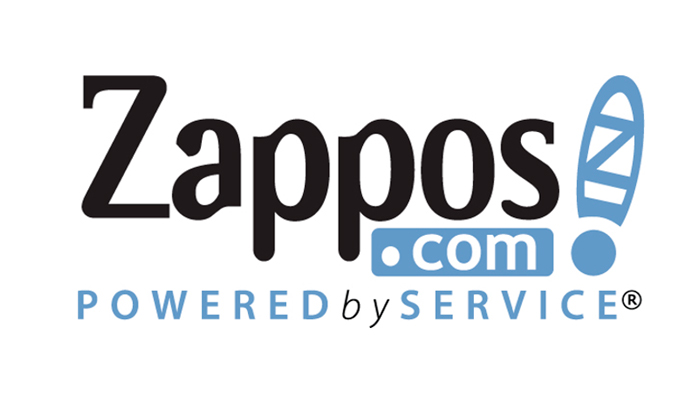
Image via ©Zappos
The real emotion behind your brand creates an authentic person-to-person connection which is essential to your success because fundamentally you must win the heart first in order to move the mind — so you can convert positive sentiment into profitably growing sales.
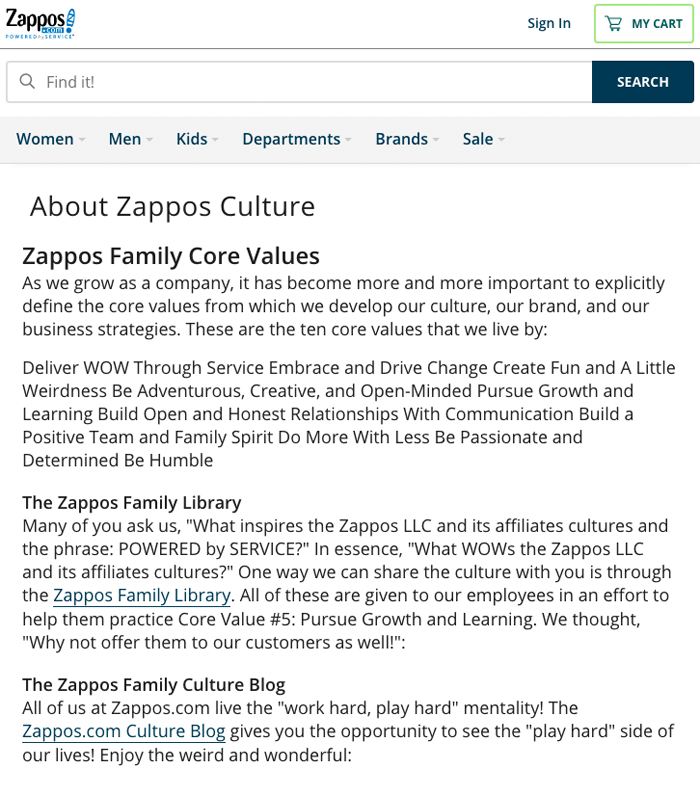
Image via ©Zappos
A prime example of a brand with a strong identity and cultural structure is Zappos. Passionate about what they do, they go above and beyond to truly live and express a unique brand culture which has a level of impact on their community that most organisations are enviable of.
As shared on the Zappos website; It has become more and more important to explicitly define the core values from which we develop our culture, our brand, and our business strategies. These are the ten core values that we live by:
- Deliver WOW Through Service
- Embrace and Drive Change
- Create Fun and A Little Weirdness
- Be Adventurous, Creative, and Open-Minded
- Pursue Growth and Learning
- Build Open and Honest Relationships With Communication
- Build a Positive Team and Family Spirit
- Do More With Less
- Be Passionate and Determined
- Be Humble [2]
Beyond stating how important their values are across the entire brand, Zappos takes it one step further with a culture and values blog. A place where everyone from employees to customers have a say. On the Zappos blog you can read a plethora of articles that include what the company is up to as well as things like “Getting Back To Nature” and “Work Habits For Success”. More than a place to buy shoes, Zappos has expertly positioned themselves as a lifestyle brand.
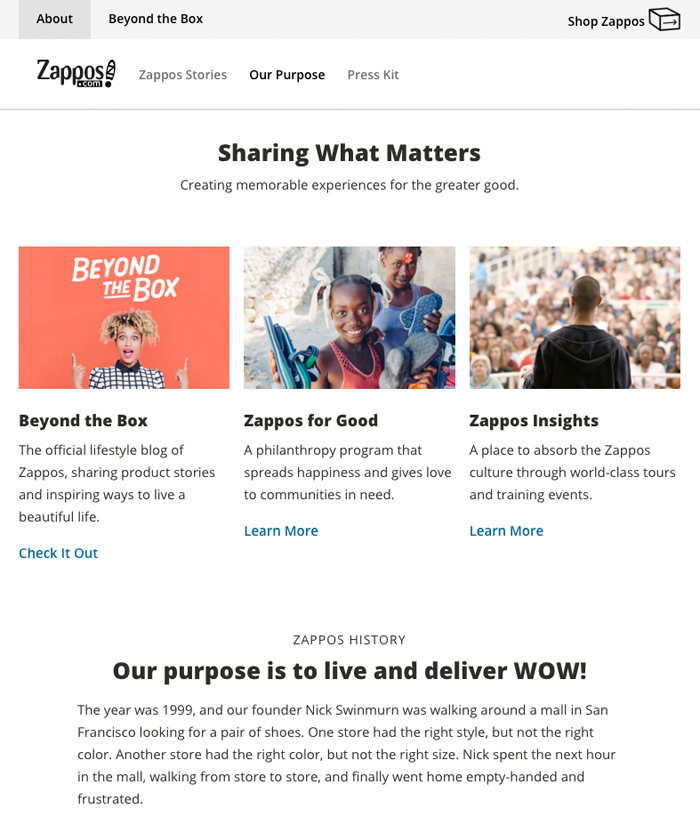
Image via ©Zappos
Related: How to Use Brand Values to Drive Unwavering Customer Trust and Commitment
2. Don’t Underestimate The Importance of Employee Happiness in Your Brand Culture
The people who work for you, are your company. They are your voice — the living expression of your brand. They are your image and champions. They are the embodiment of your brand! Considering that employees are your brand, it is only natural then that, in order to be truly successful, companies want to have happy employees because a happy team is way more innovative and productive.

Image via ©Google
With the examination of data taken from one of the world’s leading tech companies, Google it is clear that happiness directly correlates to productivity, customer retention, and brand loyalty.

Image via ©Google
As stated by one of the world’s top business consultants, “Google has a unique culture. It’s not the typical corporate culture. In fact, just by looking at pictures inside the Googleplex, you can see that it looks more like an adult playground, not a place for work. But Google’s success can be attributed to this culture. Google has people whose sole job is to keep employees happy and maintain productivity. Human resources, or People Operations, is a science at Google. They’re always testing to find ways to optimize their people, both in terms of happiness and performance.”[3]
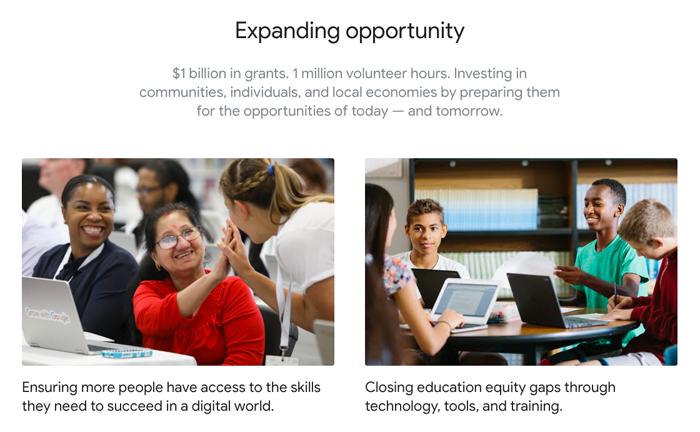
Image via ©Google
Always working to improve employee happiness, Google creates a culture that is welcoming and designed for its people. From new employee meet and greets to new mother benefits, this tech goliath even offers free food, rest areas, and ever adapting programmes. There is no doubt Google considers it’s people every step of the way.
3. Do Create Brand Culture of Great Customer Experience That Reflects Quality from End-to-End
“Aligning culture and brand is not just about creating happy employees, it’s also applied to how a business operates.” [4] From start to finish, every step of the way, your culture should encourage an enjoyable experience for all your people.
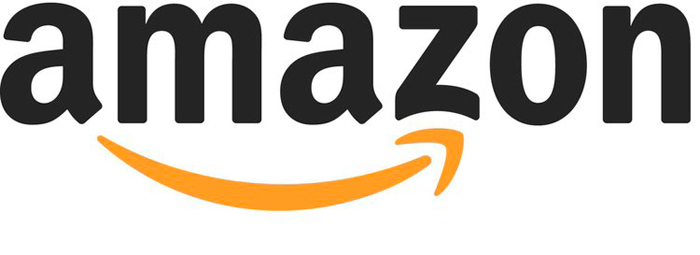
Image via ©Amazon
Related: Top 10 Brands for Customer Experience and What You Can Learn From Them
Take Amazon for example — “Our vision is to be earth’s most customer-centric company; to build a place where people can come to find and discover anything they might want to buy online.”
With an implacable focus on customer experience, Amazon understands that setting standards of excellence internally reflects externally and this is what sets them way ahead of the rest.
Related: 4 Ways You Can Be More Customer-Centric to Grow Your Business
Currently one of the top-ranked companies globally, CEO — “Bezos and his team get everyone in the company to operate with high standards, by first defining what good looks like. As you work to implement this in your own company, make sure you frequently push examples of your quality expectations to the forefront.”[7]
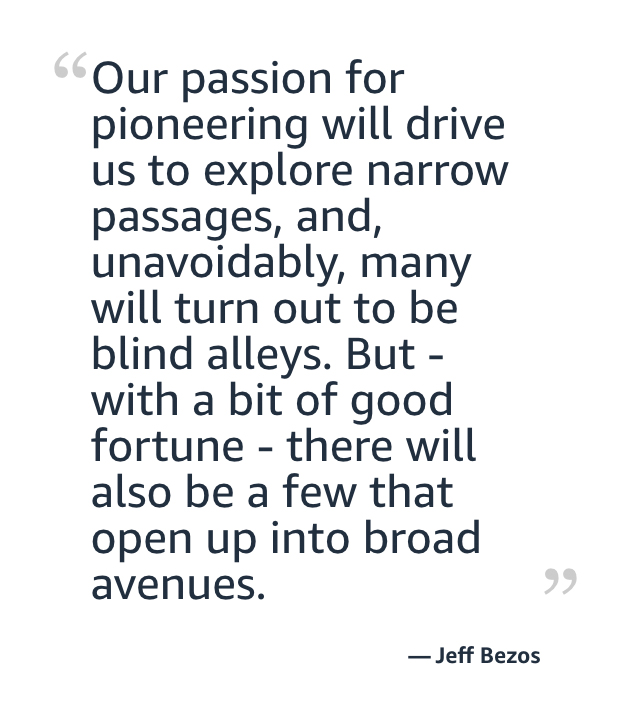
Image via ©Amazon
Delivering quality services and adapting programmes is this powerhouse brands integral to the Amazon brand strategy — its purpose, vision and mission and promise every second of every day.
Related: Want Your Customers to be Loyal, Super, Raving Fans? What’s Your Brand Promise?
Are you a business leader, manager or entrepreneur who wants to re-evaluate or build your brand strategy so you can effectively develop and leverage your brand culture to attract and retain top talent, increase customer and employee brand loyalty so you can increase your sales? Are you curious about how to build or scale a highly successful standout brand? Join one of our branding workshops because they empower you to build your brand, enhance customer experience, expand your market impact and create higher perceived value so you can command a premium.
In fact, the Persona Brand Building Blueprint™ Mastermind is all about fast-tracking you, your brand and your business through the brand building, brand strategy process using big-brand know-how with proven agile branding systems that get results so you can grow your business faster and more effectively.
If you want a tailor-made solution specifically for your brand then we also provide in-house bespoke Persona Brand Building Blueprint™ Intensives working with you and your team so you can grow your business faster and more profitably. Contact us to discover more [email protected] or +353 1 8322724
4. Don’t Shy Away From Being the Face of Your Brand to Build Your Brand Culture
Many companies use the founder, visionary or CEO behind the brand as their spokesman. After all, who else is better to show the world what your company is all about than the person who envisioned the brand in the first place? Offering something for people to connect with by physically becoming part of and advocating for your brand culture will create a connection that we as humans crave.
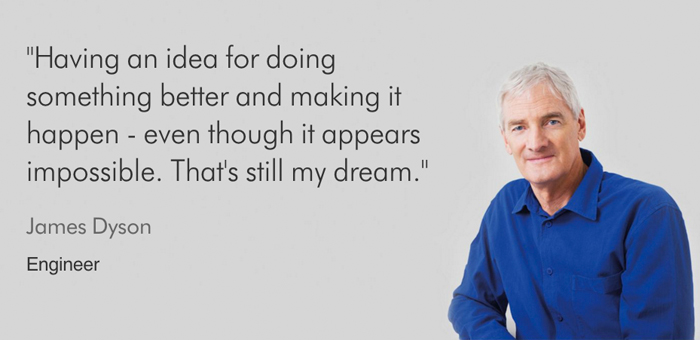
Image via ©Dyson
Related: The Impact of Company Brand Culture On Driving Performance and Increasing Sales
Take a look at Dyson. Now a global household name, many people across the world know the voice of founder, James Dyson.

Image via ©Dyson
This is because he is the man who appears in countless commercials. Taking time to dutifully explain how products work as well as how a specific product fits into his own life, this inventor/founder is seemingly just like all of the people who buy his products. Mr. Dyson helps customers “buy into” the culture with compassion, understanding, and an unrelenting focus on quality.
5. Do Evaluate Your Brand Culture Development – Past, Present and Future
It’s critically important to monitor not only your brand but the external market in order to stay relevant to both current and new customers. Regular brand audit health checks help you track your brand weaknesses, strengths and opportunities for innovation and growth relative to competitors, changing trends and the broader market.
Assuming you’re building and managing a brand with longevity in mind, then brand culture must be multigenerational and embrace social change to stay relevant to your primary target audiences.
Related: Use Psychology in Your Brand Strategy to Create Irresistible Brand Experiences and Increase Sales
A positive culture needs room to grow at a community level internally and externally. If it’s developed as a strong bedrock in the form of your brand strategy it will underpin your success. It has to be acknowledged though, that culture is one of the more challenging aspects of building a brand, particularly when a business is scaling, but with careful focus and a committed mindset, it richly rewards as you can see in the organisations mentioned.
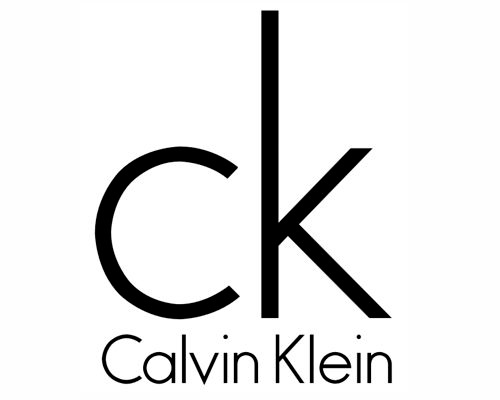
Image via ©Calvin Klein
Let’s take a look at an all-time iconic brand. Calvin Klein has had the foresight to adapt its culture as times change. With brand culture at the core of everything they do, in recent years this brand has surveyed, evaluated and listened to its community with great success.
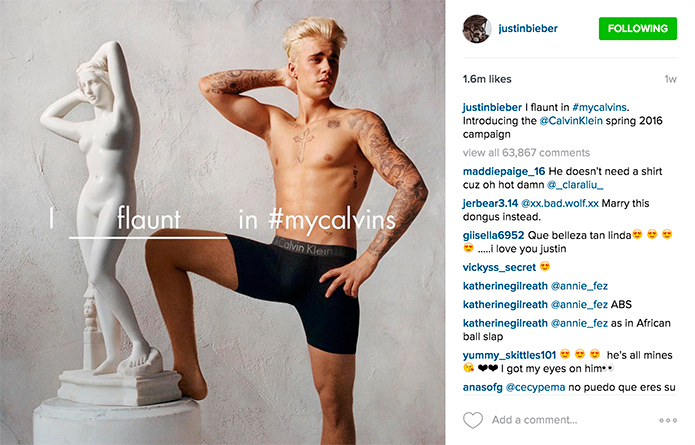
Image via ©Calvin Klein
Related: Redefining Your Brand Culture After a Rebrand, Sale or Merger
Identifying their brand had a weak perception and relevance amongst newer generations, they leveraged pop culture as a way to attract and retain the attention of younger ideal audiences. Bridging the gap between parents and children, they were able to start household conversations that sparked the interest of their entire multigenerational community.
6. Don’t Forget to Build an Inspiring Brand Culture That Nurtures Trust
Carefully select, brand induct, train, nurture and trust the people that represent, champion and manage your brand. Highlight your brand culture by leveraging your people and creating a space for curiosity to be cultivated.
Related: How To Use Brand Ambassadors To Open New Revenue Channels
When you leverage the people that embody your brand (your people), you ultimately and naturally create strong positive sentiments. This excitement and empathy can then become trust which ultimately engenders loyalty.
Related: How to Build a Powerful Employer Branding Strategy so You Attract and Retain Top Talent to Grow Your Business

Image via ©Yotpo.
A newer and more modestly size company doing an excellent job at creating a culture of happy people is YotPo. In the business of trustworthy customer reviews, this tech company’s mission says it all. — “We’re on a mission to provide brands with everything they need to win in a customer-centric world. With the most advanced solutions for user-generated content marketing, referrals, and loyalty programs, Yotpo helps brands accelerate growth by enabling advocacy and maximizing customer lifetime value.”[7]
Openly calling themselves a people company, they use the faces and stories of both employees and customers to express what kind of brand culture they value and encourage while building trust — not to mention interesting work parties and a fun office space.
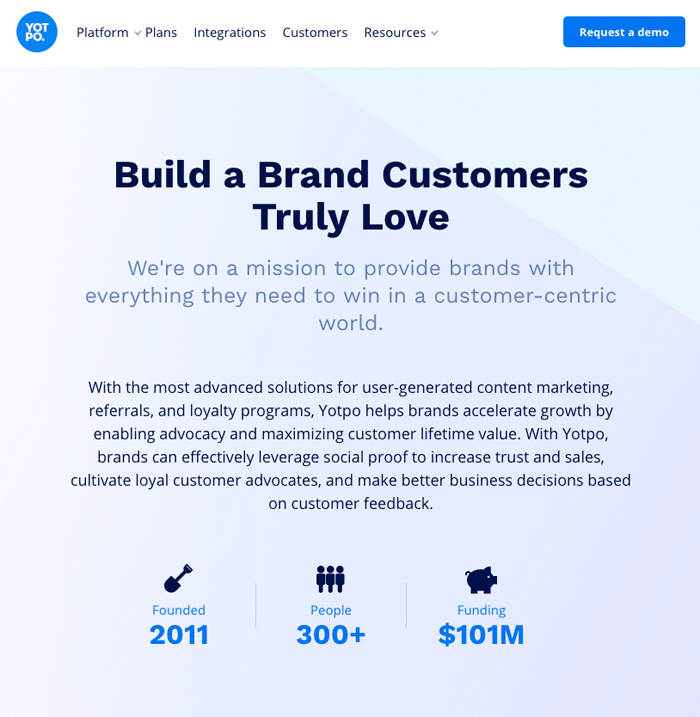
Image via ©Yotpo.
Related: Design is NOT Branding Podcast, Lorraine Carter Guest Interview with Alan Dowling on Inc60
If you’d like to discover more about building and maintaining a thriving, high performing, highly profitable standout brand, then get in touch because we’d love to help you make your brand and business into a profit powerhouse.
- Schedule an appointment — we can meet in person or online
- Allow us to create a customized plan for you
- Let’s implement the plan together
- Contact us [email protected] or ring +353 1 8322724 (GMT Dublin/London 9:00 – 17:30 weekdays)
Lorraine Carter is a branding expert and international speaker delivering talks that inspire and motivate along with masterclasses and workshops that inform and support transformational outcomes fast, and consultancy expertise that solves problems so you can outshine, outperform and leave your competitors way behind.
Final Word
The best brand cultures make everyone in their community feel as though they are part of something that really matters, something bigger than themselves.
A strong brand culture is compelling to both top talent, stakeholders and your ideal customers. It engages everyone, including the CEO, C-suite, employees and customers alike. A brand that is iconic and has a stand out culture is not just something that people want a part of but are happy to pay a premium for because it connects emotion and becomes part of lives in ways which people value highly.
Culture is everything that encompasses your brand — the bedrock underpinning your whole organisation, the reason for your very existence. Without a strong irresistible culture to embody your brand, there’s little or nothing for anyone to hold onto and no real compelling reason to buy, let alone pay a premium.
So don’t be tempted to underestimate the power of a really strong brand strategy or make the mistake of thinking branding is only for big business. It matters to smaller businesses too, it’s fundamental to your success and is extremely accessible on a ‘comparative shoestring’ if you use agile branding strategy underpinned by big-brand know-how.
Questions to Consider
- What commonalities have you evaluated in brands mentioned and their brand culture?
- How does your brand shape your culture?
- Identify three brands mentioned above that have a brand culture that stresses the importance of happy people. How could you embody some of the lessons learned in your organisation?
- How does your culture bring your brand to life?
- Of the brands mentioned did you notice two that leverage social times to help build their brand culture?
- Of the many brands you know, name ten that use their CEO, Founder or CMO as the face of their brand. What are the biggest takeaways you can apply to increase your commercial success?
- Are their weaknesses in your current brand culture? Would a brand audit health check help you identify and remedy those vulnerabilities?
- What excites you most about your brand culture? Could a refresh of your brand strategy help you become even more successful?
Your Persona Client Satisfaction Guarantee
- When you work with us we’ll create a customized brand building plan and strategy with clear investment for you tailored to your specific requirements and preferences
- You’ll know each step of your brand and business building journey before we start because we’ll discuss it, document it and agree on it with you before work commences
- You’ll have timelines, key milestones and deliverables to evaluate and approve for each stage and part of your brand and business building process
- Because we know the unexpected sometimes happens we can make adjustments along the way if you need it and if something extra is requested we’ll ensure you’re fully appraised about what that entails before committing
- As we achieve pre-agreed objectives you’ll be able to evaluate your brand building work and strategy in progress, coupled with the outcomes to ensure return on investment
Get in touch today because we’d love to get started helping you build your standout, powerhouse brand so you can increase your profits and leave your competitors way behind.
Email us [email protected] or ring us +35318322724 (GMT 9:00-17:30) and ask about our VIP Brand Strategy Re-Evaluation.
Sources
- Harvard Business Review – Brand Is Culture, Culture Is Brand
- Zappos Culture
- Google data review https://www.youtube.com/watch?v=ziUGffMFlfw
- Inside Google’s Culture of Sucess – Neil Patel
- Forbes – “Aligning brand and culture”
- Inc. – “why Jeff Bezos Puts Culture…”
- https://www.yotpo.com/about/
- https://www.forbes.com/sites/karagoldin/2017/10/11/aligning-your-brand-and-culture-has-never-been-more-important/#431cc6122ed9
- https://www.inc.com/sonia-thompson/how-jeff-bezos-cultivates-a-culture-of-high-standards-at-amazon.html
- https://hbr.org/2010/09/brand-is-culture-culture-is-br



